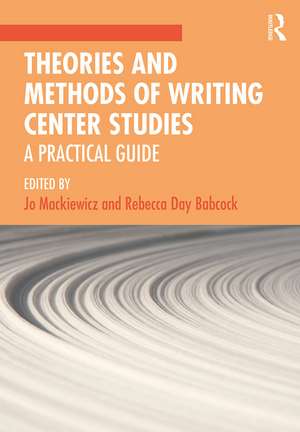Theories and Methods of Writing Center Studies: A Practical Guide
Editat de Jo Mackiewicz, Rebecca Babcocken Limba Engleză Hardback – 20 noi 2019
In the collection, accomplished writing center researchers discuss the theories and methods that have enabled their work, providing readers with a useful and accessible guide to developing research projects that interest them and make a positive contribution.
It introduces an array of theories, including genre theory, second-language acquisition theory, transfer theory, and disability theory, and guides novice and experienced researchers through the finer points of methods such as ethnography, corpus analysis, and mixed-methods research.
Ideal for courses on writing center studies and pedagogy, it is essential reading for researchers and administrators in writing centers and writing across the curriculum or writing in the disciplines programs.
Preț: 683.73 lei
Preț vechi: 916.13 lei
-25% Nou
Puncte Express: 1026
Preț estimativ în valută:
130.83€ • 136.88$ • 108.68£
130.83€ • 136.88$ • 108.68£
Carte tipărită la comandă
Livrare economică 02-16 aprilie
Preluare comenzi: 021 569.72.76
Specificații
ISBN-13: 9780367188481
ISBN-10: 0367188481
Pagini: 246
Ilustrații: 10
Dimensiuni: 178 x 254 mm
Greutate: 0.62 kg
Ediția:1
Editura: Taylor & Francis
Colecția Routledge
Locul publicării:Oxford, United Kingdom
ISBN-10: 0367188481
Pagini: 246
Ilustrații: 10
Dimensiuni: 178 x 254 mm
Greutate: 0.62 kg
Ediția:1
Editura: Taylor & Francis
Colecția Routledge
Locul publicării:Oxford, United Kingdom
Cuprins
1. Introduction to the Collection Part 1:Theories 2. Vygotskyan Learning Theory 3. Genre Theory: A Research Approach for Understanding Learning, Agency, and Materiality in the Writing Center 4. Writing Center Research and Critical Race Theory 5. Category Is… Queer Theory, Queering Research and Queerer Centers 6. Bringing Feminist Theory Home 7. Transfer Theory: A Guide to Transfer-focused Writing Center Research 8.Writing Center Research and Disability Theory 9. Activity Theory 10. Second Language Acquisition Theories and Writing Center Research Part 2: Methods 11. Grounded Theory: Explanations and Possibilities 12. Ethnography—More or Less 13. Histories, Historiographies, and Historical Research in the Writing Center 14. The Potential of Writing Center Case Study Research Design as Public Scholarship Chapter 15. Extending Our Research: Meta-Analysis in the Writing Center 16. Rhetorical Analysis: Choices in Exploring and Connecting Our Writing Center Studies and Stories 17. Discourse Analysis, Critical Discourse Analysis, and Conversation Analysis 18. Corpus Approaches to Writing Center Research 19. Survey Methods for Research and Assessment in Writing Centers 20. Mixed Methods Research in Writing Centers 21. Conclusion
Notă biografică
Jo Mackiewicz is a professor of rhetoric and professional communication at Iowa State University. Recently, she published the books The Aboutness of Writing Center Talk and Writing Center Talk over Time. With Isabelle Thompson, she has published a number of articles about writing center discourse, as well as the book Talk about Writing, now in its second edition.
Rebecca Day Babcock is the William and Ordelle Watts Professor at the University of Texas of the Permian Basin. She also serves as director of undergraduate research. Her latest books are Writing Centers and Disability (with Sharifa Daniels) and Researching the Writing Center: Towards an Evidence-Based Practice (with Terese Thonus; revised edition).
Rebecca Day Babcock is the William and Ordelle Watts Professor at the University of Texas of the Permian Basin. She also serves as director of undergraduate research. Her latest books are Writing Centers and Disability (with Sharifa Daniels) and Researching the Writing Center: Towards an Evidence-Based Practice (with Terese Thonus; revised edition).
Descriere
This collection helps students and researchers understand the foundations of writing center studies in order to make sound decisions about the types of methods and theoretical lenses that will help them formulate and answer their research questions.
